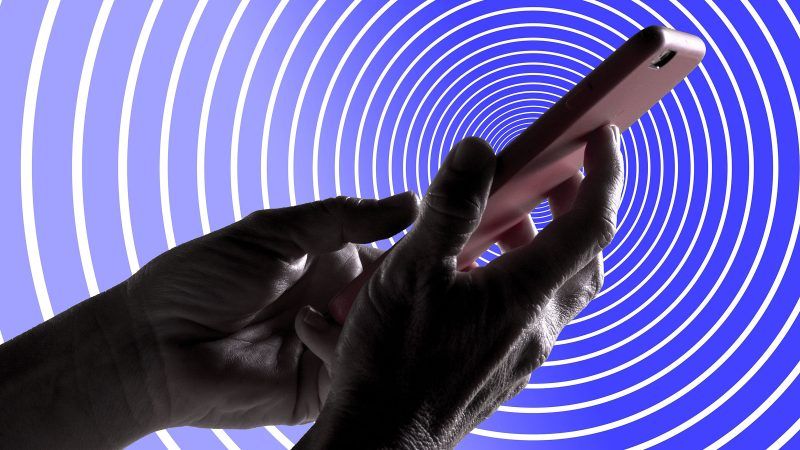Trump and Comey Are United Against Encrypted Communications
Don’t worry—America’s ruling factions still disagree over who should be in charge of the snooping.

For all the public sparring between the two inflated egos known as Donald Trump and James Comey, the president and the former FBI director have some important commonalities. For starters, they both hate it when the common people keep secrets from the ruling class of which they represent competing factions.
The point of agreement between the two political antagonists became clear on January 14, when President Trump complained that Apple executives "refuse to unlock phones used by killers, drug dealers and other violent criminal elements." Some of us poked at our ears, wondering if we were hearing echoes. After all, not so long ago, as head of the FBI, Comey tried to force Apple to unlock encrypted cell phones and raged that Apple, Google, and other companies "market something expressly to allow people to place themselves beyond the law."
Trump agreed with Comey back then, too, by the way; in 2016, he called for a boycott of Apple until such time as the company helped the FBI break iPhone security.
Apparently, not as much divides these two men as they like to let on.
In public, Trump calls Comey a "disgrace" and Comey fires back at a man he calls a "strange and slightly sad old guy." But—aside from the fact that they're both correct about each other's flaws—that's intramural combat between power addicts over who should wield the power. That the public should be poked, prodded, and intruded upon is a given for Comey and Trump. And it's a sentiment that binds so many of our would-be lords and masters in public office.
The shared nature of official nosiness becomes clear when you remember last November's bipartisan vote to extend the Patriot Act, a measure that the Electronic Frontier Foundation says "broadly expands law enforcement's surveillance and investigative powers and represents one of the most significant threats to civil liberties, privacy, and democratic traditions in US history." Even as Democrats debated impeaching Donald Trump—a move they later approved—they overwhelmingly joined with the Trump administration to support the surveillance bill's extension.
Trans-partisan hand-holding on surveillance state measures is certainly nothing new among the political class. The Patriot Act originally passed during the presidency of Republican President George W. Bush, but with plenty of cross-aisle support.
"I drafted a terrorism bill after the Oklahoma City bombing," senator and current leading Democratic presidential wannabe Joe Biden boasted to The New Republic after the Patriot Act's passage. "And the bill John Ashcroft sent up was my bill."
Biden's anti-privacy efforts extend back so far that he inspired Phil Zimmermann to complete the development of PGP encryption software.
Later, as vice president, Biden threatened countries that considered offering asylum to surveillance whistleblower Edward Snowden.
Sen. Elizabeth Warren (D-Mass.), another leading contender for the Democratic presidential nomination, frets that the data encrypted communications will "allow companies to hide from 'government spying'—such as text messages and chatroom transcripts—have proven to be 'key evidence' in previous regulatory and compliance cases."
It seems Trump and Comey are in good company on the issue. Well, good-ish—for a certain D.C.-centric value of the word.
"Lawmakers are giving big tech firms an ultimatum: Give police access to encrypted communications or we'll force you," The Washington Post reported last month.
"It ain't complicated for me," Senate Judiciary Committee Chairman Lindsey Graham (R-S.C.) told representatives from Facebook and Apple at a Capitol Hill hearing in December. "You're going to find a way to do this or we're going to do it for you."
"You all have got to get your act together or we will gladly get your act together for you," said Sen. Marsha Blackburn (R-Tenn.), who also sits on the judiciary committee.
Ranking Democratic member Dianne Feinstein (Calif.), meanwhile, said she is "determined to see that there is a way that phones can be unlocked when major crimes are committed," whether tech companies like it or not.
And so on. Trump and Comey's frenemy act opposing communications privacy for people who don't draw government paychecks is the rule, not the exception.
Sure, there are some surveillance skeptics and privacy advocates among the political class. But they're rare, and except for a very few civil liberties-oriented and government-skeptic types who are usually on the outs with the real powerbrokers, they're awfully unreliable on the issue.
The problem is that the Trumps, Comeys, Grahams, Bidens, Feinsteins, Blackburns, and Warrens of the world largely agree that the government that defines their lives and gives them importance should be vastly powerful. The rationales they come up with depend on the specific priorities of the politician in question, the cultural moment, and the audience, but they're forever arguing in favor of an intrusive state from which we can keep no secrets.
"It had become clear, to me at least, that the repeated evocations of terror by the political class were not a response to any specific threat or concern but a cynical attempt to turn terror into a permanent danger that required permanent vigilance enforced by unquestionable authority," whistleblower Edward Snowden wrote of his growing awareness of what lay behind the surveillance state in Permanent Record, his 2019 memoir.
Substitute "violent criminal elements" or "criminal action by Wall Street" or "child abusers" or any other justification politicians might come up with if you wish, but it all leads in the same direction. Ultimately, the members of the political class may fight tooth and nail, but it's not over whether Leviathan should paw through our communications. They just disagree over who should be in charge of the pawing.

Show Comments (45)